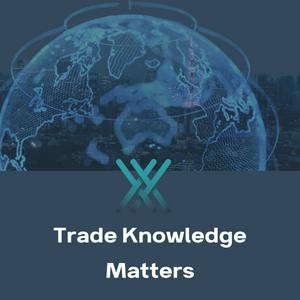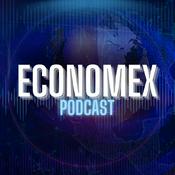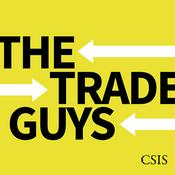25 episodios
- In this episode of Trade Knowledge Matters, we explore the intricate relationship between international trade and gender, highlighting historical contexts, current trends, and the challenges and opportunities faced by women in trade.
Our host, Amar sits down with experts Dr. Judith Fessehaie (Head, Women and Trade Programmes/SheTrades Initiative, ITC) and Dr. Simonetta Zarrilli (Adviser, ArtNet) to discuss the impact of global value chains, protectionism, and digital trade on women's participation in the economy, emphasizing the need for inclusive policies and collaboration across sectors to achieve gender equality in trade.
Key Takeaways
Mainstream economics has historically neglected gender issues in trade policy.
Women have played significant roles in trade throughout history.
Global value chains have created new job opportunities for women.
Despite progress, the gender pay gap remains a significant issue.
Women are often underrepresented in leadership and ownership roles in trade.
Rising protectionism poses new challenges for women in low-income countries.
Sustainability standards can enhance gender equality in trade.
Digital trade offers new avenues for women entrepreneurs.
Intersectionality must be considered in trade policies.
Collaboration among various stakeholders is essential for progress.
Follow us on:
Twitter: @TKENews
LinkedIN: Trade Knowledge Exchange
Check out our website.
Also, we would like to hear from you, our listeners! Send us an email, [email protected]
Please, rate, review, share and subscribe to our podcast. - If you have been wondering what De Minimis means and how it affects you or your business? This episode gives you an overview.
In this episode, Amar sits down with Carlos Grau Tanner, Director-General, Global Express Association (GEA) to discuss De Minimis and the tariffs placed on them by President Trump in April 2025. They explain what 'de minimis' is, how it affects consumers, MSMEs, and its impact on trade policy.
Key Takeaways
De minimis provisions are crucial in trade policy.
Threshold values for de minimis vary by country.
These provisions help small businesses absorb costs.
E-commerce growth is linked to de minimis rules.
Changes to de minimis can impact consumer prices.
Local businesses advocate for a level playing field.
Customs efficiency is vital for trade facilitation.
Follow us on:
Twitter: @TKENews
LinkedIN: Trade Knowledge Exchange
Check out our website.
Also, we would like to hear from you, our listeners! Send us an email, [email protected]
Please, rate, review, share and subscribe to our podcast. - In this episode, Amar sits down with experts, Prof. Alan Winters, former Co-Director of the Centre for Inclusive Trade Policy (CITP), Emeritus Professor of Economics and Founding Director of the UK Trade Policy Observatory at the University of Sussex, and Prof. Lorand Bartels, Professor of International Law at Cambridge and a Counsel at Freshfields LLP and Chair of the UK Trade and Agriculture Commission. They discuss:
The first hundred days of Trump's administration have seen significant changes in trade policy.
Tariffs have been a central focus, with various motivations behind their implementation.
The unpredictability of Trump's trade policy has caused chaos in financial markets.
Countries are reacting differently to US tariffs based on their economic and security interests.
The EU and Canada have taken significant steps in response to US tariffs, indicating a shift in global trade dynamics.
The concept of reciprocal tariffs reflects a transactional approach to trade negotiations.
The long-term implications of US trade policy could undermine the rules-based trading system.
And more
Follow us on:
Twitter: @TKENews
LinkedIN: Trade Knowledge Exchange
Check out our website.
Also, we would like to hear from you, our listeners! Send us an email, [email protected]
Please, rate, review, share and subscribe to our podcast. - Global trade tensions are rising following the announcement of President Trump's Reciprocal Tariffs!
In this episode, Amar sits down with friends of the podcast and trade experts, Dr Deborah Elms, Head of Trade Policy, Hinrich Foundation and Dr. Anirudh Shingal, Professor of Economics, SP Jain Institute of Management and Research. They discuss the recent implementation of tariffs by the US on its trading partners, particularly focusing on the impact on Asian countries. They highlight the complexities of these tariffs, the varying effects on different countries, and the potential for regional responses and reforms. Both Deborah and Anirudh provide insights into how countries in Southeast Asia and South Asia are navigating these challenges, the importance of regional integration, and the prospects for future trade agreements.
Key Takeaways
The US tariffs are based on bilateral deficits, not trade restrictions.
Asian countries face significant tariff rates, impacting their economies.
Cambodia and Vietnam are particularly affected by high tariffs.
Countries may need to absorb tariff-induced price hikes or reduce import duties.
ASEAN countries have diverse interests and challenges regarding tariffs.
China's market dependency complicates Southeast Asia's trade strategies.
Countries should use tariffs as an opportunity for internal reforms.
Regional integration is essential for navigating trade challenges.
India is actively pursuing trade agreements with multiple countries.
Revisiting the India-ASEAN trade agreement could improve market access. Governments should focus on small businesses in trade policies.
Legal language must be accessible to small businesses.
Reconsidering non-starter ideas in trade is essential.
India's trade policy needs significant reforms to compete globally.
Services trade is crucial for economic growth in India.
Removing barriers to services trade can boost manufacturing.
Competition in global trade is increasing due to tariffs.
Developing economies must be integrated into services trade.
Current events may signify a historical turning point in trade.
Leadership is needed to navigate the future of multilateralism.
Follow us on:
Twitter: @TKENews
LinkedIN: Trade Knowledge Exchange
Check out our website.
Also, we would like to hear from you, our listeners! Send us an email, [email protected]
Please, rate, review, share and subscribe to our podcast. - What exactly is trade in services? Why is it relevant when discussing trade and development, especially in Africa? How does it work?
If you have asked these questions, then this episode provides some of the answers. In this episode, Amar sits down with services experts, Beatrice Chaytor, Head of Trade in Services, AfCFTA and Prachi Agarwal, Research Fellow, International Economic Development Group, ODI Global. They discuss:
The critical role of services trade in Africa's economic development, particularly in the context of the African Continental Free Trade Area (ACFTA).
The importance of services in driving structural transformation, enhancing productivity, and fostering economic diversification.
The challenges and opportunities with services trade
And much more
Key Takeaways
Trade policy extends beyond Washington DC to global contexts.
Services trade is a rapidly growing component of the economy.
Africa's services exports account for a small percentage of global trade.
The African Continental Free Trade Agreement (ACFTA) aims to enhance regional trade.
Services can drive economic growth and diversification in Africa.
Investment in services can create jobs, especially for women and youth.
The ACFTA includes protocols on trade in services and investment.
Regional Economic Communities (RECs) play a crucial role in trade integration.
Challenges include regulatory barriers and lack of awareness about services.
Follow us on:
Twitter: @TKENews
LinkedIN: Trade Knowledge Exchange
Check out our website.
Also, we would like to hear from you, our listeners! Send us an email, [email protected]
Please, rate, review, share and subscribe to our podcast.
Más podcasts de Gobierno
Podcasts a la moda de Gobierno
Acerca de Trade Knowledge Matters
Trade Knowledge Matters is a fortnightly podcast under the Trade Knowledge Exchange, an initiative that brings together partner organisations across three continents to supply objective analysis on international trade matters. We discuss international trade and the challenges it faces, policy insights and analysis of international trade policy, specifically exploring UK trade policy.
Sitio web del podcastEscucha Trade Knowledge Matters, Upstanders y muchos más podcasts de todo el mundo con la aplicación de radio.net

Descarga la app gratuita: radio.net
- Añadir radios y podcasts a favoritos
- Transmisión por Wi-Fi y Bluetooth
- Carplay & Android Auto compatible
- Muchas otras funciones de la app
Descarga la app gratuita: radio.net
- Añadir radios y podcasts a favoritos
- Transmisión por Wi-Fi y Bluetooth
- Carplay & Android Auto compatible
- Muchas otras funciones de la app


Trade Knowledge Matters
Escanea el código,
Descarga la app,
Escucha.
Descarga la app,
Escucha.























